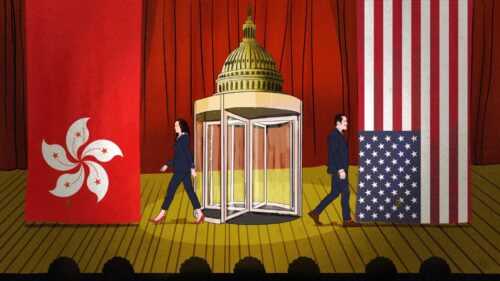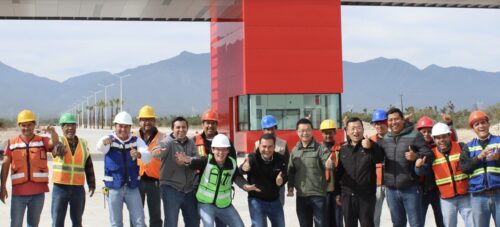Pence’s speech on China

The White House has published a transcript of Vice President Mike Pence’s speech. Below are his key points:
The charges against China
Pence’s speech is a litany of complaints. This is the gist of them:
- Beijing “is employing a whole-of-government approach, using political, economic, and military tools, as well as propaganda, to advance its influence and benefit its interests in the United States.”
- Trade and business problems that Pence names: Made in China 2025, the trade deficit, Chinese requirements that American companies “hand over their trade secrets as the cost of doing business in China,” and intellectual property theft.
- Military problems: China’s high levels of military spending, Chinese patrols around the Senkaku/Diaoyu Islands, and the militarization of South China Sea islands despite Xi’s promise not to.
- “China’s aggression was on display this week,” Pence says, “when a Chinese naval vessel came within 45 yards of the USS Decatur as it conducted freedom-of-navigation operations in the South China Sea.”
- Human rights problems: Pence mentions an “unparalleled surveillance state,” the Great Firewall, the social credit system, and the persecution of Chinese Christians, Buddhists, and Muslims. He notes the self-immolations in Tibet.
- Xinjiang: Pence says that “the Communist Party has imprisoned as many as one million Muslim Uyghurs in government camps where they endure around-the-clock brainwashing. Survivors of the camps have described their experiences as a deliberate attempt by Beijing to strangle Uyghur culture and stamp out the Muslim faith.”
- “Debt diplomacy” — Pence uses those words and says China “is offering hundreds of billions of dollars in infrastructure loans to governments from Asia to Africa to Europe and even Latin America,” but that the terms are opaque and “the benefits invariably flow overwhelmingly to Beijing.” He specifically mentions Sri Lanka and Venezuela as examples.
- Taiwan: Pence complains that the Party “convinced three Latin American nations to sever ties with Taipei and recognize Beijing,” which threatens the stability of the Taiwan Strait. He says that “America will always believe that Taiwan’s embrace of democracy shows a better path for all the Chinese people.”
- Pence complains that Beijing compelled Delta Airlines “to publicly apologize for not calling Taiwan a ‘province of China’ on its website,” and “pressured Marriott to fire a U.S. employee who merely liked a tweet about Tibet.” He also says the Party “is rewarding or coercing American businesses, movie studios, universities, think tanks, scholars, journalists, and local, state, and federal officials” to portray China in a positive light.
- “Billions of dollars on propaganda outlets in the United States and, frankly, around the world” are another concern. Pence mentions China Radio International and CGTN. He also says “Beijing provides generous funding to universities, think tanks, and scholars, with the understanding that they will avoid ideas that the Communist Party finds dangerous or offensive,” but does not name Confucius Institutes.
- “The Communist Party has also threatened and detained the Chinese family members of American journalists who pry too deep,” says Pence, also noting that China blocks the websites of U.S. media organizations and makes it harder for American journalists to get visas. “China experts in particular,” says Pence, “know that their visas will be delayed or denied if their research contradicts Beijing’s talking points.”
- The Chinese Students and Scholars Association (CSSA) comes under fire: Pence says CSSA groups “alert Chinese consulates and embassies when Chinese students, and American schools, stray from the Communist Party line.” He mentions the Yang Shuping incident.
- Without citing any evidence aside from tariffs that target Trump-voting states, and the China Daily’s insert in the Des Moines Register, Pence repeated Trump’s claims that “China has initiated an unprecedented effort to influence American public opinion, the 2018 elections, and the environment leading into the 2020 presidential elections.”
Pence outlines the American response
Pence begins his speech by saying that President Donald Trump “made our relationship with China and President Xi a priority,” adding that “they’ve worked closely on issues of common interest, most importantly the denuclearization of the Korean Peninsula.” He talks about the historic friendship between the U.S. and China, noting the ginseng trade, and that when “China suffered through indignities and exploitations during her so-called ‘Century of Humiliation,’ America refused to join in.”
But then the litany of complaints starts. Mingled among the accusations about China’s bad behavior are talking points about America’s responses. The main points are:
- “We’re modernizing our nuclear arsenal,” says Pence, and “making the strongest military in the history of the world stronger still,” with a new Trump-approved military budget of $716 billion. He mentions Trump’s much-ballyhooed Space Force, “new cutting-edge fighters and bombers,” and “a new generation of aircraft carriers and warships” that will help “assert American interests across the Indo-Pacific.”
- “We’re also implementing tariffs on $250 billion in Chinese goods, with the highest tariffs specifically targeting the advanced industries that Beijing is trying to capture and control,” says Pence, noting that the U.S. “will levy even more tariffs, with the possibility of substantially more than doubling that number, unless a fair and reciprocal deal is made.” The transcript notes that this statement was greeted with applause.
- The U.S. is “building new and stronger bonds with nations that share our values across the region, from India to Samoa” and “forging new trade deals on a bilateral basis.” Pence says Washington is “streamlining international development and finance programs” to give countries “a just and transparent alternative to China’s debt-trap diplomacy.”
- CFIUS — the Committee on Foreign Investment in the U.S. — is “heightening our scrutiny of Chinese investment in America to protect our national security from Beijing’s predatory actions.”
- Pence warned Google not to launch a censored search engine in China.
Language notes
Pence quotes Lǔ Xùn 鲁迅 (he mangled the pronunciation into “Loo Shawn”):
The great Chinese storyteller Lu Xun often lamented that his country, and he wrote, “has either looked down at foreigners as brutes, or up to them as saints,” but never “as equals.”
The original Chinese is:
中国人对于异族,历来只有两样称呼:一样是禽兽,一样是圣上。从没有称他朋友,说他也同我们一样的
zhōngguó rén duìyú yìzú, lìlái zhǐyǒu liǎngyàng chēnghu: yīyàng shì qínshòu, yīyàng shì shèngshàng. cóng méiyǒu chēng tā péngyǒu, shuō tā yě tóng wǒmen yīyàng de
Pence says there is an ancient Chinese proverb that reads: “Men see only the present, but heaven sees the future.” It’s not clear what he means by this, nor which proverb he is referring to.
The closest I can think of is: “谋事在人,成事在天” (móushì zài rén, chéngshì zài tiān). However, this saying is an almost exact equivalent of “Man proposes and God disposes.” If any reader has an idea what Pence is referring to, please let me know.
Reporting elsewhere
- Pence speech to string together a narrative of Chinese aggression / NYT (porous paywall)
- Pence to tell China: We will not be intimidated in South China Sea / Reuters
- Mike Pence: Google shouldn’t help China censor internet searches / Washington Examiner
- Pence accuses China of anti-Trump campaign / The Hill
- Pence says Google should halt Dragonfly app development / Reuters via Channel NewsAsia






